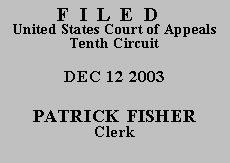

| ISAIAS MENDOZA,
Plaintiff-Appellant, Defendants-Appellees. |
No. 03-2113
(D.C. No. CIV-02-1611) |
The Prison Litigation Reform Act (PLRA), 42 U.S.C. § 1997e(a), requires prisoners to exhaust "available" administrative remedies prior to initiating litigation concerning the conditions of their confinement. The apparent futility of those remedies does not obviate the need to exhaust them. Jernigan v. Stuchell, 304 F.3d 1030, 1032 (10th Cir. 2002). Therefore, Mr. Mendoza's assertion that he attempted to exhaust his administrative remedies does not save him from the dismissal without prejudice issued by the district court.
On appeal, Mr. Mendoza argues the PLRA does not apply in his caseone against a private correctional facility. This contention is without merit. In Jernigan, the court dismissed a claim against the same private company Mr. Mendoza is suing on the ground that the plaintiff in that case failed to exhaust administrative remedies pursuant to the PLRA. Id. at 1033. See also Herrera v. County of Santa Fe, 213 F. Supp. 2d 1288, 1293 (D. N.M. 2002) (holding PLRA exhaustion requirements apply to private entities). The district court's dismissal without prejudice was proper. We GRANT Mr. Mendoza's motion to proceed in forma pauperis and AFFIRM the district court's dismissal of Mr. Mendoza's claims.
ENTERED FOR THE COURT
Stephanie K. Seymour
Circuit Judge
*.After examining appellant's brief and the appellate record, this panel has determined unanimously that oral argument would not materially assist the determination of this appeal. See Fed. R. App. P. 34(a)(2) and 10th Cir. R. 34.1(G). The case is therefore submitted without oral argument. This order and judgment is not binding precedent, except under the doctrines of law of the case, res judicata, or collateral estoppel. The court generally disfavors the citation of orders and judgments; nevertheless, an order and judgment may be cited under the terms and conditions of 10th Cir. R. 36.3.